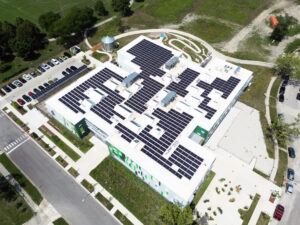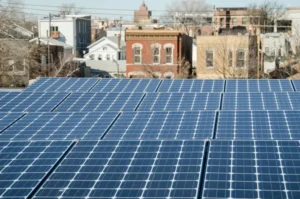Choosing a Solar Company: Who Can You Trust with Your Illinois Solar Incentives?
The Illinois Solar Gold Rush Is Here. So Are the Shovel Salesmen.
Let’s call it what it is: The Illinois Solar Gold Rush.
If you own a home with a sun-drenched roof, you’re sitting on a claim. And suddenly, everyone knows your name.
You’ve felt it, haven’t you? The phone calls. The door-knocks. The ads that follow you from website to website, all promising free energy and a fast payday. It’s a lot of noise. And in that noise, it’s easy to feel more overwhelmed than optimistic.
It’s a familiar story. When there’s gold in the hills, the first people to get rich are the ones selling shovels.
In our story, the “gold” is Illinois’ incredible stack of solar incentives—the Triple Stack that can cut the cost of a system by more than half. The “shovels” are the solar panels themselves.
And here’s the problem: A shovel doesn’t guarantee you’ll find gold. It’s just a tool. The person selling it to you might point you toward a random patch of dirt, wish you luck, and walk away with your money, whether you strike it rich or not.
The real value isn’t in the shovel. It’s in the guide who has the map—the one who knows the geology, who understands the terrain, and who can show you exactly where to dig.
This is the critical difference between a partner and a panel-pusher. The critical question is no longer if you should go solar in Illinois. It’s who you trust to take you there.
Your Solar Installer Isn’t a Roofer. They’re Your New Strategic Advisor.
Let’s be blunt. Most people think choosing a solar company is like hiring a roofer or a plumber. You check their license, look at some photos of past jobs, and pick the one who gives you a fair price for a good product.
That logic makes sense. It’s also completely wrong for solar in Illinois.
A roofer’s job is to keep the rain out. A plumber’s job is to make the water flow. Their work is physical, tangible, and largely finished when they pack up their truck.
In Illinois, the physical act of installing panels on your roof is the easiest part of the job. It’s a solved problem. The real work—the work that determines whether your solar project is a financial grand slam or a costly strikeout—is navigating the paperwork.
It’s about being a master of the Triple Stack:
- The 30% Federal Tax Credit.
- The Illinois Shines program (your SREC revenue).
- The local utility rebates.
These aren’t just coupons. They are complex financial instruments that require strategy. The SREC program, in particular, is a market-based system. Maximizing its value isn’t an installation task; it’s a financial one.
Hiring a solar company that only wants to talk about the brand of panels they use is like hiring a financial advisor who only wants to talk about the brand of calculator on their desk. The tool is irrelevant if the strategy is flawed.
A “good” installation can still be a bad investment. If your installer miscalculates your SREC value, files the paperwork incorrectly, or can’t build a financial model that accurately predicts your return, you could leave thousands—or even tens of thousands—of dollars on the table. The panels on your roof will work just fine, but your investment won’t.
The most important work doesn’t happen with a drill. It happens with a spreadsheet.
Spotting the Difference: The Calculator vs. The Craftsman
You’re about to have conversations with solar companies. You need a way to sort the wheat from the chaff, and fast.
The secret is to listen not for what they say, but for how they think. Are you talking to a Calculator or a Craftsman?
A Calculator sees your home as a math problem. Roof size + panel wattage = a price. It’s a transaction.
A Craftsman sees your home as a unique project. Your goals + your property + the financial incentives = a custom strategy. It’s a partnership.
Here’s how to tell them apart in minutes.
Red Flags: Telltale Signs of a “Calculator Company”
Listen for these and you’ll know you’re talking to a panel-pusher, not a partner.
- They give you a price in the first 5 minutes. A thoughtful plan takes more than 300 seconds to build. A quick-draw quote isn’t a sign of efficiency; it’s a sign they’re running a script. They haven’t considered your home’s specific electrical setup, your long-term financial goals, or the nuances of your utility’s interconnection process. They’re selling you a product, not a plan.
- They get vague about the SREC money. The Illinois Shines program is the financial engine of your project. A Calculator Company will treat it like magic beans, saying, “You’ll get a big check from the state!” Ask them when. Ask them how that value is calculated. Ask them to show you the math. If they hand-wave, they don’t truly understand the financial instrument they’re selling you.
- The conversation is all about the equipment. If they spend 20 minutes talking about the superiority of one panel brand over another but only 2 minutes on your payback period, you’re talking to a hardware salesperson. The panels are a commodity. The strategy is the craft.
Green Lights: What a True Solar Partner Does Differently
A true partner—a Craftsman—operates from a completely different playbook. Their process is the product.
- They start with a conversation, not a conclusion. Their first questions won’t be about your roof. They’ll be about you. What are your goals? Are you looking for the fastest payback? The lowest possible electric bill? To maximize your home’s value? They listen before they teach.
- They build you a financial roadmap. A partner delivers a plan, not just a price. They’ll show you a year-by-year breakdown of your energy savings, your SREC income, and your total return on investment. They will have modeled your specific situation. The quote is just one page in a much larger, more valuable strategy document.
- They welcome the hard questions. A true partner is confident in their math and their process. They want you to ask about panel degradation, inverter warranties, and the SREC payment timeline. They have the answers because they’ve already done the work. Their transparency is the ultimate sign of their expertise.
Your Home Isn’t a Transaction. It’s a Strategy.
Let’s zoom out for a moment.
Your home is likely the biggest investment you will ever make. It’s not just a collection of shingles, siding, and windows. It’s the backdrop for your life and the cornerstone of your financial future.
A Calculator Company sees a transaction. They see a roof that can fit a certain number of panels and a utility bill they can shrink. They are playing a numbers game, and your home is just one more data point. Their job ends when the last bolt is tightened.
A true partner sees the bigger picture. We see a strategic asset.
The decision to add solar to your home is a 25-year decision. It will affect your home’s value, your monthly budget, and your financial portfolio for a generation. It’s not a purchase; it’s a policy change for your personal economy.
You wouldn’t hire a stockbroker who only knew how to press the “buy” button. You expect them to have a strategy. You wouldn’t trust a wealth manager who couldn’t explain their long-term plan for your portfolio.
Why would you demand any less for your home?
Getting a quote is easy. Anyone can give you a number. Developing a strategy is different. It requires expertise, foresight, and a genuine investment in your outcome. It means building a financial blueprint that shows you exactly how this decision will play out—not just next year, but a decade from now.
The goal isn’t to buy solar panels. The goal is to implement a successful solar strategy.
Let’s See What Your Plan Looks Like
You’ve done the hard work. You’ve learned the landscape of the Illinois Solar Gold Rush. You know the critical difference between a Calculator and a Craftsman.
So let’s not ask for a quote. A quote is a number. A plan is a roadmap.
We want to build your custom solar strategy. This is where our team of energy consultants—the financial minds and strategy experts—do their best work. We’ll look at your home, listen to your goals, and model the entire financial picture for you. We’ll show you the math. We’ll map out the timeline for your SREC income. We’ll build you a strategy for the next 25 years.
The first step is simple.
Go to our contact page and fill out the form to begin the conversation. It takes a few minutes, but it’s the start of a process that could change your home’s financial future for decades to come.
A transaction ends with a handshake. A partnership begins with a plan.
Let’s build yours.





